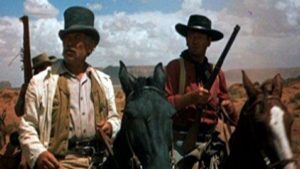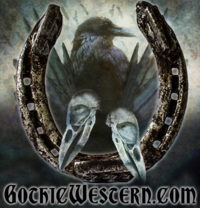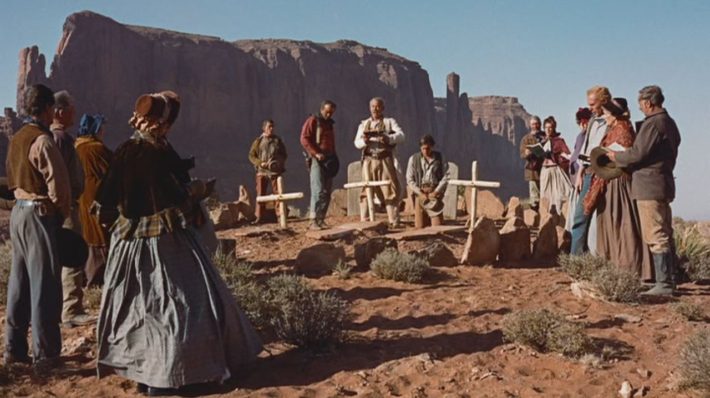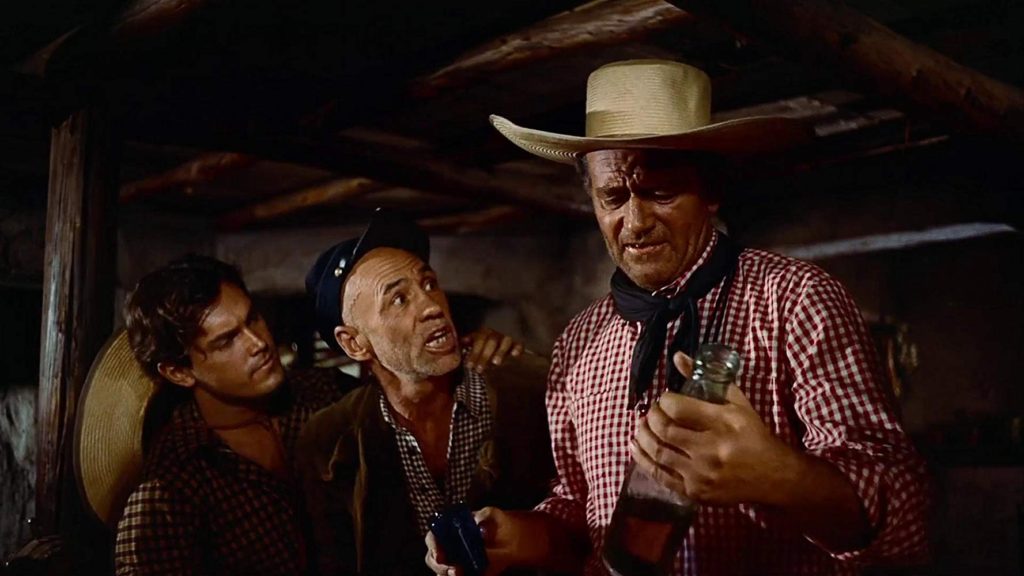The Searchers was made in the dying days of the classic dark Western, which faltered when Indians ceased to be typecast as savages. Revisionist Westerns, including Ford’s own Cheyenne Autumn in 1964, took a more enlightened view of native Americans, but the Western audience didn’t want moral complexity; like the audience for today’s violent thrillers and urban warfare pictures, it wanted action with clear-cut bad guys.
 The Searchers opens by introducing a happy family, then having most of them die horribly at the hands of Comanche raiders, but even that isn’t the really grim part. The grim part is the rest of the film. As Ethan Edwards (John Wayne) and the family’s adopted son, Martin Pawley (Jeffrey Hunter), track the Comanche, many miserable years pass, and the question of whether Wayne’s wee niece Debbie (Natalie Wood) —the family’s one survivor—will be found alive becomes a question of whether she’ll be sane and fit for white-folk society even if they do. Once they finally do reach her, Wayne decides that living with (and, to his clear, vivid disgust, being sexually compromised by) Indians has tainted her, and he promptly tries to murder her.
The Searchers opens by introducing a happy family, then having most of them die horribly at the hands of Comanche raiders, but even that isn’t the really grim part. The grim part is the rest of the film. As Ethan Edwards (John Wayne) and the family’s adopted son, Martin Pawley (Jeffrey Hunter), track the Comanche, many miserable years pass, and the question of whether Wayne’s wee niece Debbie (Natalie Wood) —the family’s one survivor—will be found alive becomes a question of whether she’ll be sane and fit for white-folk society even if they do. Once they finally do reach her, Wayne decides that living with (and, to his clear, vivid disgust, being sexually compromised by) Indians has tainted her, and he promptly tries to murder her.
The Searchers indeed seems to be two films. The Ethan Edwards story is stark and lonely, a portrait of obsession, and in it we can see Schrader’s inspiration for Travis Bickle of Taxi Driver; the Comanche chief named Scar (Henry Brandon) is paralleled by Harvey Keitel’s pimp named Sport, whose Western hat and long hair cause Travis to call him “chief.” Ethan doesn’t like Indians, and says so plainly. When he reveals his intention to kill Debbie, Martin says “She’s alive and she’s gonna stay alive!” and Ethan growls: “Livin’ with Comanches ain’t being alive.” He slaughters buffalo in a shooting frenzy, saying, “At least they won’t feed any Comanche this winter.” The film within this film involves the silly romantic subplot and characters hauled in for comic relief, including the Swedish neighbor Lars Jorgensen (John Qualen), who uses a vaudeville accent, and Mose Harper (Hank Worden), a half-wit treated like a mascot. There are even musical interludes. This second strand is without interest, and those who value The Searchers filter it out, patiently waiting for a return to the main story line.
Ethan Edwards, fierce, alone, a defeated soldier with no role in peacetime, is one of the most compelling characters Ford and Wayne ever created (they worked together on 14 films). Did they know how vile Ethan’s attitudes were? I would argue that they did, because Wayne was in his personal life notably free of racial prejudice, and because Ford made films with more sympathetic views of Indians. This is not the instinctive, oblivious racism of Griffith’s Birth of a Nation. Countless Westerns have had racism as the unspoken premise; this one consciously focuses on it. I think it took a certain amount of courage to cast Wayne as a character whose heroism was tainted. Ethan’s redemption is intended to be shown in that dramatic shot of reunion with Debbie, where he takes her in his broad hands, lifts her up to the sky, drops her down into his arms, and says, “Let’s go home, Debbie.” The shot is famous and beloved, but small counterbalance to his views throughout the film–and indeed, there is no indication be thinks any differently about Indians.




